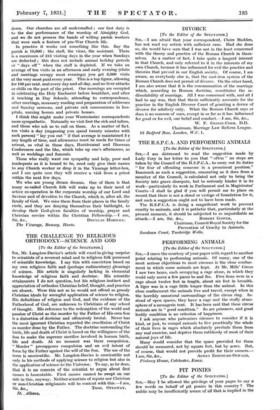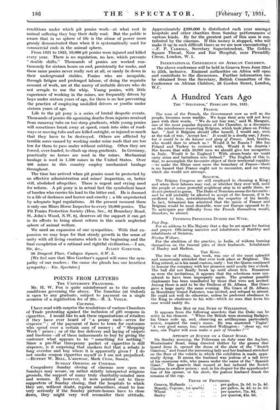PIT PONIES
[To the Editor of the SPECTATOR.]
SIR,—May I be allowed the privilege of your pages to say a few words on behalf of pit ponies in this country ? The public may be insufficiently aware of all that is implied in the
conditions under which pit ponies work—at what cost in animal suffering they buy their daily coal. But the public is aware .that in no sphere of life is the abuse of power more grossly demonstrated than when it is systematically used for commercial ends in the animal sphere.
From 1921 to 1925, 10,000 pit ponies were injured and killed every year. There is no regulation, no law, which prevents " double shifts." Thousands of ponies are worked con- tinuously for sixteen hours on end, persistently for weeks, and these same ponies never really rest at all, or rarely lie down in their underground stables. Ponies who are incapable, through fatigue and prolonged labour, of doing the requisite amount of work, are at the mercy of irritable drivers who do not scruple to use the whip. Young ponies, with little experience of working in the mines, are frequently driven by boys under sixteen years of age, for there is no law preventing the practice of employing unskilled drivers or youths under sixteen years of age.
Life to the pit pony is a series of brutal despotic events. Thousands of ponies die agonizing deaths from injuries received from runaway tubs on too steep gradients, while young ponies will sometimes break away at speed, crash into sides of road- ways or moving tubs and are killed outright, or injured so much that they have to be destroyed. Others are afflicted by terrible sores caused by working under mine roofs that are too low for them to pass under without rubbing. Often they are forced, over-loaded, to climb up steep gradients. In Germany, practically no horses are used in the mines. Mechanical haulage is used in 1,500 mines in the United States. Over 480 mines in this country employ mechanical haulage throughout.
The time has arrived when pit ponies must be protected by an effective administration and mines' inspection, or, better still, abolished altogether. There is urgent and crying need for reform. A pit pony is in actual fact the symbolical beast of burden who carries his load to the bitter end. He is doomed to a life of darkness and horror and cruelty ; a life unprotected by adequate legal regulations. At the present moment there is only one Mines Horse Inspector to every 10,000 ponies. The Pit Ponies Protection Society (Hon. Sec., 82 Boundary Road, St. John's Wood, N.W. 8), deserves all the support it can get in its efforts to bring about reform in this much neglected sphere of animal welfare.
We need an expansion of our sympathies. With that ex- pansion we may hope for that steady growth in the sense of unity with all living creatures which is the beginning and the final completion of a rational and rightful civilization.—I am, 26 Draycott Place, Cadogan Square, S.W. 3. .
[We feel sure that Miss Gardner's appeal will rouse the sym- pathy of our readers : the cause she pleads has our heartiest sympathy.—En. Spectator.]











































 Previous page
Previous page